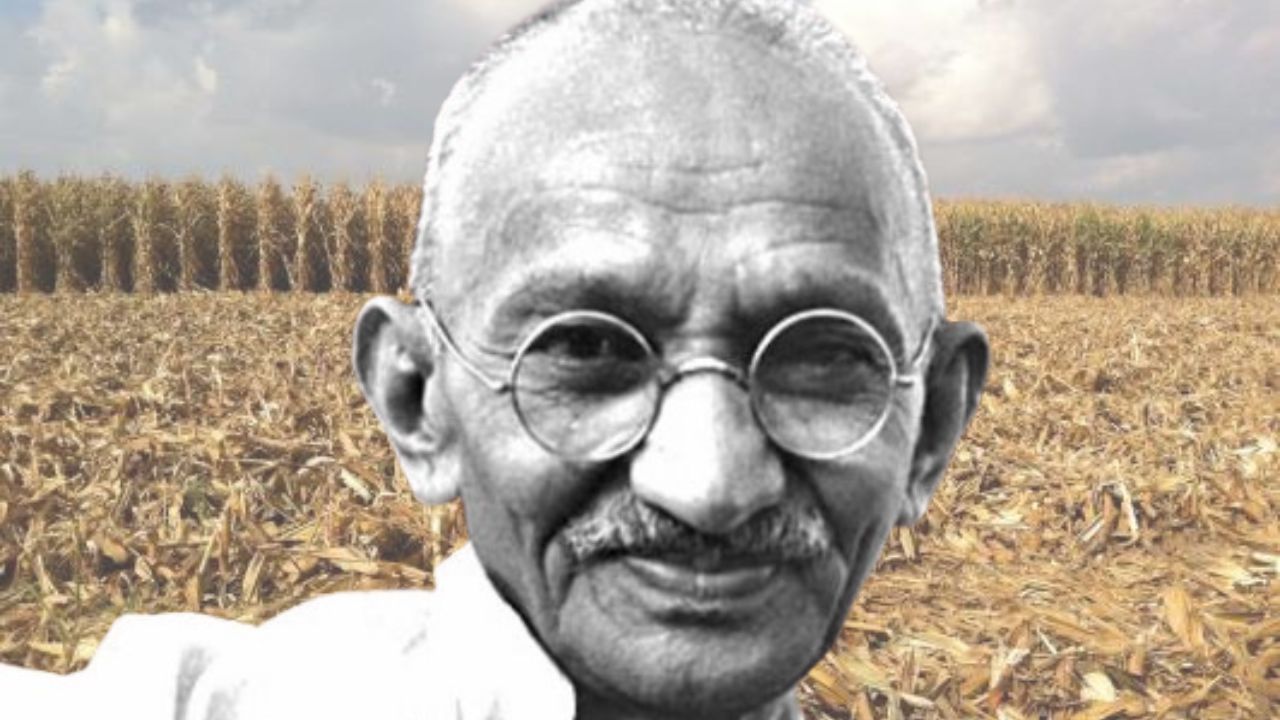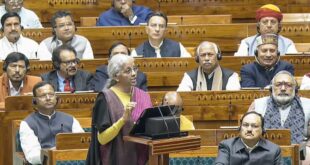 Dr. D C Srivastava
Dr. D C Srivastava
Contribution of Mahatma Gandhi can never be forgotten as a nation builder of modern India. If we look back at evolution process of India as a nation from mid eighteenth to mid twentieth century, India was congregation of discreet kingdoms, principalities and the British colony. In addition to the British, the French and the Portuguese also had their small presence in India as colonizers. Strong cultural and religious bonds as well as trade links existed amongst them. Though India became independent in 1947, the nation building process started with emergence of Mahatma Gandhi in India political scenario. When Mahatma Gandhi set his foot on Indian soil on 9th January, 1915 after spending more than two decades in South Africa, the social, economic and political environment in India was very bleak and subdued.
There was excessive economic exploitation of Indians mainly by British colonial power primarily by changing the structure of economy to fulfil the greed of British colonial power. Agriculture was used to produce the raw material such as indigo, opium, tea, and cotton for British industries and commerce, and India was made a market for cheap and finished British goods produced by British industries by destroying the local textile, leather and other cottage industries in India. Lands from farmers were taken and handed over to landlords and heavy taxes were imposed on land owners who retained a small piece of land that became economically unsustainable for the farmers. This led to abject poverty among masses across the length and breadth of India.

A series of drought and famines in 19th and early 20th century further deteriorated the living conditions of people in India. There was disappointment and lack of hope everywhere among masses and most of the people surrendered to their fate. Some people fought in piecemeal in different parts of India against British rule and its exploitative policies in India by raising their voices in newspapers, or revolting against the injustice of British colonial rule in India. But impact of such struggle against British rule could not be pan India but remained local and regional that was being suppressed by British colonial power. There was no pan Indian leader till Gandhi emerged on the political scenario. Economic condition of people in India was so bad at that time that due to abject poverty and lack of economic opportunities in India, there was mass exodus as indentured labour especially from eastern Uttar Pradesh, Bihar, Tamil Nadu and Andhra Pradesh to work in distant colonies in various parts of Asia, Africa and Latin America in sugar, tea, coffee, cocoa and rubber plantations in British, French and Dutch colonies. This led to migration of about fifteen hundred thousand people from India to Mauritius, Trinidad, Guyana, Fiji, Suriname, Natal, Malaysia and Sri Lanka etc. as indentured labourer who were later duped, terrorised and exploited. India was bereft of leadership who could unite people from all parts of India and people across the India could connect with him. In this condition and situation Mahatma Gandhi emerged on Indian political scene.
Before Mahatma Gandhi’s arrival in India, the story of his struggle for civil rights movement for people in South Africa against British Government was known to intellectuals in India, who saw in Gandhi, a lot of potential to take up political leadership of India to fight against the British rule in India. As Gandhi was a very pragmatic leader, he first travelled across length and breadth of India on advice of Gopal Krishna Gokhale to see and understand India. He purposely travelled in third class compartment of railway to understand the common people better and to connect himself with them. He met the people in urban as well as in rural areas across India. His travel across India united the common masses of India for same cause i.e. independence of India and that too for one India that was initial stage of nation building.
Also Read : Infrastructure of a University: A Comprehensive Definition
During his extensive tour in India, when he observed that most of the people do not have sufficient clothes to cover their full body, so he also started wearing a small loin cloth like common masses. His simple living appealed to the common masses and inspired them to emulate the same that also made them to believe in him and become his follower in large numbers. In that process he became an effective and great leader.
If a leader sets small, doable and achievable targets for his followers which is beneficial for his followers, society and nation, the followers will become attached to the leader, many more followers will join and connect with him, and they will follow the path shown by him whole heartedly. Accordingly, Gandhi asked his followers and people to do these small things. And one among these issues was cleanliness, and maintenance of personal hygiene and sanitation. Impressed by level of cleanliness and maintenance of personal hygiene by British during his stay in Britain, he accorded a top priority to cleanliness and personal hygiene recognizing its importance on public health and its social and economic implications. Gandhi himself was a champion in campaigning for cleanliness of personal as well as public places and maintaining personal hygiene during independence movement and that continued even after independence. Gandhi had realized long back the social and economic implications of hygiene and sanitation for the society in general and especially for the poor strata of society in particular.
Gandhi has accorded a very high importance to cleanliness and sanitation since his days in South Africa and propagated the same after his arrival in India. The major victims of poor cleanliness are normally poor people, who have poor access to nutrition, sanitation infrastructure and quality healthcare services. When poor falls sick, his economic activities gets disrupted and source of livelihood comes to grinding halt, and if he is sole bread winner in family, then he and his family has to suffer a lot more. In many cases poor gets trapped into quagmire of debt at exorbitantly high interest rates from a local moneylender from where it becomes difficult to come out. And thus he gets permanently into debt and poverty trap. By cleaning his own toilet and public toilets in South Africa as well as in India as British educated and successful lawyer which was only done by people of lower social and economic strata of society, he demonstrated that no work is menial. Many more in South Africa and back home in India followed the examples set by him and thus his initiatives and action promoted the dignity of labour.
Gandhi considered village as self governed social and economic unit, and this unit should be self sufficient in the sense that it will meet the basic needs of food, clothing, shelter and other daily needs of people living there. Not only this, but he also aspired that village industries should develop and thrive. The people in villages were by and large self reliant on food and shelter in their traditional ways of food habits and living style, but for clothing they were dependent largely on textile products imported from Britain, as British colonial power in India systematically destroyed India’s vibrant textile cottage industries in order to make India a big market for its textile products produced by big British textile industries after industrial revolution in Britain; and in that process India became a supplier of raw material for British Industries.
Gandhi realised this problem that if villages in India have to be made self sufficient in meeting its basic needs, Indians should boycott the use of British textiles for meeting its need for clothing by spinning and weaving clothes themselves. Accordingly, he made a call to the Indian masses to boycott the use of British made textiles. As an alternative to British textile he made use of home spun clothes i.e. Khadi a mass movement.
It was one of the very potent weapons against economic imperialism and exploitation by Britain and use of home spun clothes could ameliorate the economic hardship of Indian people. Gandhi also urged the people to boycott the use of other imported goods and used the goods produced locally in cottage industries in India. This way he showed a path of self sufficient habitation.
Gandhi believed if every one and especially people from lowest social and economic strata of society is not included in social and economic enterprise, India can not achieve its goal of independence from British rule and in turn can not attain social and economic development and self rule. It also had a political implication for fight against British rule at that time. Gandhi rightly visualised that unless and until people from lower strata of society is at least socially integrated in mainstream society and politics, who were very large in number, the fight against British rule will not be mass movement.
Social exclusion of people of lower caste in social hierarchy created barriers for them to exploit economic opportunities. And to achieve social inclusion, the first tool which he used was eradication of untouchability, which was very much prevalent in those days in India. He practiced against untouchability by living with the people of lower castes considered untouchable and vociferously advocated against untouchability. He called them “Harijan” meaning people of God. Through his social engineering, he could ameliorate economic hardship to some extent by providing economic opportunities to low caste untouchable people through social inclusion and also garnered their support for his fight against British rule. Thus Gandhi championed the cause of social and economic inclusion in India.
Also Read : Asia will become exposed to extreme rainfalls and floods by the decade’s end
Gandhi’s extensive travel in India made him to know thoroughly about the country, identifying the strengths, weaknesses, opportunities and threats prevailing in the country. Gandhi’s efforts made towards cleanliness, inspiring the society towards self-sufficient habitations; promoting dignity of labour; promoting cottage industries and promoting social and economic inclusion made massive impact on Indian society. All these innovative initiatives taken by Gandhi contributed in nation building process in India. Thus, Gandhi made an unfathomable contribution as an agent of change in Indian society towards its betterment. Though structure of society and economy both have changed dramatically over the years, but many of those challenges are still there in different forms and intensity in an interconnected world. Colonization has been replaced by economic imperialism and fragmentation in society has deepened on the lines of caste, religion, and linguistic basis. Under these circumstances, ideology of Gandhi and his action are still relevant today not only for India, but many countries across the globe.
(Author is Ex- Principal Director National Academy of Defense Production, Nagpur)
 Jubilee Post News & Views
Jubilee Post News & Views





